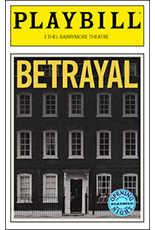
Mike Nichols seems to have a way with English newlyweds. In his first film, he directed Richard Burton and Elizabeth Taylor through the marital shambles of George and Martha. Now he's steering Daniel Craig and Rachel Weisz through another domestic disaster — only in reverse, as per Harold Pinter's 1978 Betrayal, which opened as an instant mega-hit revival Oct. 27 at the Barrymore for a limited, almost sold-out run of 11 weeks — merrily rolling along backwards to a happy beginning.
It starts with a sobering "So long" and ends with a drunken first kiss — this between Weisz and Rafe Spall, both in splendid Broadway debuts. In between are all kinds of emotional configurations involving the other man, Craig, the publisher husband of Weisz, who runs an art gallery and a secret little homefront flat for Spall, a literary agent and supplier of writers for his best friend, publisher Craig.
How's that for close quarters! The marriage triangulates for seven years (1977-68) and barely lasts much longer. They pay as they go. Nobody gets get off scot-free.
Pinter wrote this play after his clandestine affair with BBC-TV's Joan Bakewell, which spanned seven years (1962-69) of his marriage to Vivien Merchant, the actress who distinguished his play, The Homecoming — hence, the authentic anguish.
It's easy to see the hand that rocked the cauldron for "Who's Afraid of Virginia Woolf?" at work again on a marriage coming apart at the seams. Nichols knows his way around this charred turf, but this time he conceals the nastiness in British civility. His light touch is evident in the laughs he extracts from the cast with one telling nuance after another. All three actors wear his direction like a flag, each going deeper into the character. Rarely (if ever) has there been a merrier Betrayal, yet the melancholy undercurrent that runs throughout the piece stays intact.
Not the least of its pleasures is seeing Craig fully inhabit a character again. James Bond requires .007% of his talent. A great actor has been trying to get out, and this performance allows him to do just that. It ranks with some of his best (pre-Bond, of course) screen work, like the Perry Smith he played to Toby Smith's Truman Capote in "Infamous" or the granny-lover he played in "The Mother." His previous Broadway appearance in A Steady Rain, though it kept him too buttoned down, was pointing in the right direction. This time at bat, as the cuckold husband who uses his knowledge of the affair to get the upper hand on his betrayer, he connects solidly, and, when he rages his pain, it's like watching Early Kirk Douglas all over again.

Buy this Limited Collector's Edition |
Essentially, this is a three-hander, but Pinter added an Italian waiter for a drunken Craig to vent on, and Stephen DeRosa delivers it in a subtle, self-effacing manner. You can see Nichols has taught him how to get a laugh by lightly removing Spall's scotch glass when it's obvious that he's joining Craig in a big wine-whine.
A full and famous house greeted the cast with a standing ovation for jobs well-done. Unfettered by red-carpet formalities and bulb-popping paparazzi, a steady stream of unmarked celebrities poured through two portals into the theatre. Caught quite glancingly in passing: Bruce Springsteen and pretty Patti Scialfa, Steven Spielberg, and Kate Capshaw, Julia Roberts, Candice Bergen, Liz Smith with Cynthia McFadden, writer Aaron Sorkin, director Gregory Mosher, Patricia Clarkson, director Stephen Daldry (dressed as if he'd come by bike, which, in his case, is possible), Ellen Barkin, The Post's Michael Riedel, Jujamcyn's Paul Libin, Ian McKellen scruffed up for his Broadway double-bill, Vanity Fair's Graydon Carter, director Sean Mathias, Bobby Cannavale, director-choreographer of Aladdin Casey Nicholaw, Pat Schoenfeld, Chris Matthews, Roger Friedman, Dick Cavett, Diane Sawyer and "Magic Mike" Nichols.
When they filed back out 90 stimulating minutes later, the rich and the famous huddled in front of the Barrymore for a freezing eternity till their respective cars arrived to whisk them away to the elaborate after-party at The Bowery Hotel.
After the show, Julie Andrews made her way through the crowded outer lobby to give a big hug to her first husband, designer-director Tony Walton, and his wife, Gen. Before the show, a rather imposing woman with red hair and very large glasses swept grandly into the lobby and was greeted warmly by a cluster of comrades. When she passed, I asked one of them who that woman was, and she snapped back, "That's no woman. That's a lady... Lady Antonia Fraser!" (i.e., The Widow Pinter).





















